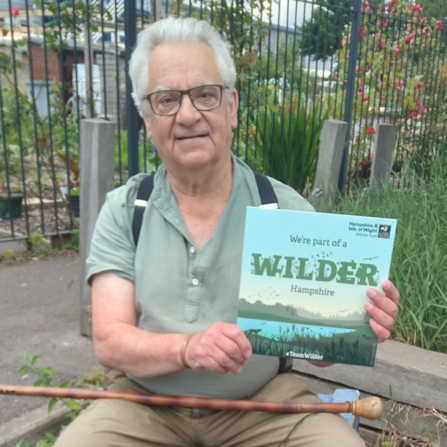Have you ever wondered how the skills you have could be used by The Wildlife Trust? Believe it or not while physical work is important, volunteering isn’t always about digging holes and planting trees. Michael O’Leary, a storyteller from Southampton, is a perfect example of someone who volunteers for The Wildlife Trust utilising his own unique set of skills. We caught up with him to hear more about what he does, how it links with nature and about his experiences of volunteering for The Wildlife Trust.
Considering volunteering? Find out one volunteer's unique way of getting involved

Tell us a bit about what it is that you do? I tell stories! Well, it’s a performance thing I suppose, focused on folk tales, which are often considered traditional stories. As traditional stories are told over generations, they change, and people put themselves into them ‐ I do the same thing. It started off when I was teaching in a primary school in Millbrook which is historically a council estate area in Southampton. I like to bring alive some of the history and natural history of the area so that children can have a bit of pride in the area they live.
Is your work influenced by nature? It is, but it's almost an intangible thing. When I work with the wildlife trust my stories are deliberately wildlife themed. When they aren’t, because the stories are so old and because of their setting there is so much that involves wildlife; that involves trees, animals, and the people’s relationships with the world that they’re in.
Do you think storytelling about nature helps to connect people with it? Yes, I think so. Which is one of the reasons I like telling stories outside. Right now, we are outside in an urban setting, but you can hear the sparrows bickering. Storytelling for me isn’t about me having total control, it’s about interactions with the audience and sounds from the setting as much as anything else.
How long have you been a member of The Wildlife Trust? I can’t remember! I joined when our children were little which would have been back in the early 80’s. I haven’t been a member consistently all the way through but joined again about 10 years ago when I went with a friend, to a meeting in the countryside, set up by The Wildlife Trust.
You volunteer to support The Wildlife Trust in urban environments; why is this important? And why specifically in urban environments? It doesn’t have to be specifically in urban environments, I could be working somewhere very rural. Here we are in the inner city of Southampton and yet just a breath away is the New Forest. But the urban thing is important to me partly because of where I live, but also because wildlife is too often stereotyped as being only in ‘pretty’ rural environments. Kids I tell stories to live‐in urban areas and are in cities as often as they are in the countryside. They want to see the value of what’s around them in the city.
Did your expectations of volunteering with The Wildlife Trust live up to reality? Yes, I think so, its only just started really. I’ve done some volunteering for them (The Wildlife Trust) in the past and have been booked by other wildlife trusts as a professional storyteller, but recently haven’t done much volunteering yet. I went to a meeting once and they were talking about needing volunteers for various projects and I thought, I would like to do that – I used to be a council gardener, I used to go and work on the land as a greenkeeper – but I didn’t really have the time. Then it occurred to me, what do I do for a living? I could volunteer that, and I was picked up for that in Portsmouth. What I’ve done so far has lived up to expectations, it was great fun!
What advice would you give someone considering volunteering for The Wildlife Trust? Just do it! Just get in there and do it. I don’t know what other advice there is. I suppose the kind of volunteering that most people are doing is a bit different to this, they might be physically working. But we all have different skills that hopefully we can offer in different ways. I think just get in there and do it. And enjoy it!
So, there you have it! Whatever it is you’re good at, you can get involved! You never know how your unique set of skills could come in handy. If just 1 in 4 people could get involved in nature in their own way, imagine the difference we could make.

